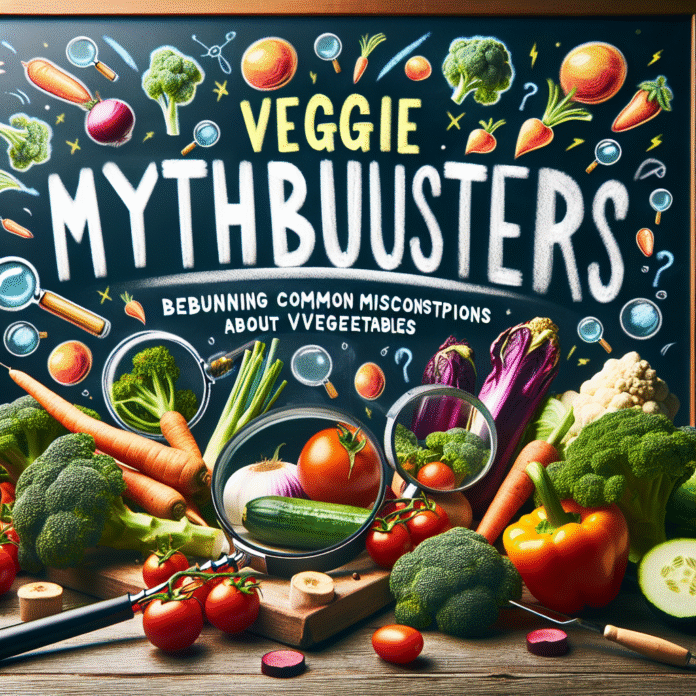Vegetables are often praised for their numerous health benefits, but despite their popularity, several misconceptions about them persist. Whether you’re a lifelong vegetarian, a dedicated omnivore, or somewhere in between, it’s essential to separate fact from fiction. Here’s a closer look at some common myths surrounding vegetables and the truth behind them.
Myth 1: All Vegetables Are Low in Calories
The Truth:
While many vegetables are indeed low in calories, not all fall into this category. Starchy vegetables like potatoes, corn, and peas contain more calories compared to non-starchy varieties like leafy greens and bell peppers. It’s important to consider portion sizes and the overall composition of your meal.
What This Means:
Including starchy vegetables in moderation can provide essential nutrients and energy, especially for active individuals. Balancing your plate with a variety of vegetables is key.
Myth 2: Cooking Vegetables Reduces Their Nutritional Value
The Truth:
While it’s true that some vitamins, especially water-soluble ones like Vitamin C and certain B vitamins, can be diminished through cooking, other methods can actually enhance nutrient availability. For instance, lightly steaming or sautéing can break down tough cell walls, making nutrients more accessible.
What This Means:
Incorporating a mix of raw and cooked vegetables in your diet can optimize nutrient intake. Each preparation method offers unique benefits.
Myth 3: Eating Vegetables Alone Is Enough for Complete Nutrition
The Truth:
Vegetables are rich in vitamins, minerals, and fiber, but they don’t provide complete nutrition on their own. They often lack essential macronutrients like protein and healthy fats.
What This Means:
For a balanced diet, pair your vegetables with other food groups. Combining them with whole grains, lean proteins, and healthy fats ensures you’re meeting your nutritional needs.
Myth 4: Organic Vegetables Are Always Healthier
The Truth:
While organic vegetables are grown without synthetic pesticides and fertilizers, they aren’t automatically healthier. Nutritional content can vary based on factors like soil quality and ripeness at harvest time.
What This Means:
Choosing between organic and conventionally grown vegetables often comes down to personal preference and budget. Regardless of the farming method, incorporating a variety of vegetables is the most important part of a healthy diet.
Myth 5: Frozen and Canned Vegetables Are Inferior to Fresh
The Truth:
Frozen and canned vegetables can be just as nutritious as fresh ones, particularly if they are processed shortly after harvest. In fact, freezing can preserve nutritional value, while canned vegetables can often be just as healthy and convenient.
What This Means:
Don’t shy away from frozen or canned options. They can offer seasonal variety and help reduce food waste while still providing essential nutrients.
Myth 6: Some Vegetables Are "Bad" for You
The Truth:
No vegetable is inherently "bad." Each type offers unique health benefits and potential drawbacks (for instance, oxalates in spinach can impact calcium absorption). Food is best viewed in the context of an overall diet rather than isolated choices.
What This Means:
Emphasize diversity in your vegetable intake. Enjoy a range of vegetables to reap their individual health benefits, and approach food with a mindset of balance rather than restriction.
Myth 7: Peeling Vegetables Makes Them Healthier
The Truth:
In many cases, the skin of vegetables contains a wealth of nutrients, fiber, and antioxidants. Peeling can remove these beneficial compounds. However, it’s vital to wash them thoroughly to remove dirt and pesticides.
What This Means:
Embrace the whole vegetable whenever possible. If you’re concerned about pesticides, consider purchasing organic or washing non-organic produce thoroughly.
Conclusion
Debunking these vegetable myths can not only empower you to make better dietary choices but also enrich your overall eating experience. By embracing a wide variety of vegetables—and understanding the truths behind common misconceptions—you can optimize your nutrition and enjoy all the health benefits they have to offer. So, let’s celebrate vegetables for the nutritious all-stars they are, while continuing to question and learn about our food choices.






